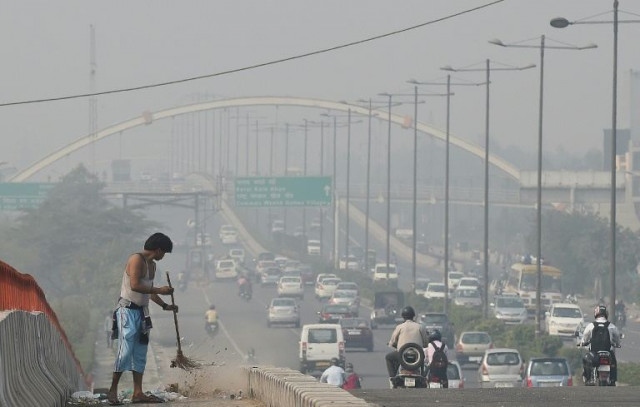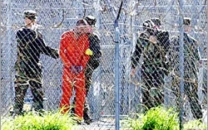India court orders truck toll to improve Delhi's toxic air
Centre for Science and Environment says thousands of trucks pour into Delhi every night adding to the cocktail of smog

An Indian sweeper cleans a flyover as smog covers the capital's skyline the morning after celebrations for the Diwali festival in New Delhi on October 24, 2014. PHOTO: AFP
Successive Delhi governments have been criticised for failing to curb pollution from industry and chronic traffic in the city of 17 million, ranked as having the world's worst air quality by the World Health Organisation.
Acting on a petitioner's plea, the Supreme Court approved an extra charge of INR700 on light commercial vehicles and INR1,300 on large trucks entering Delhi.
Read: India court gives New Delhi 3 days to come up with plan to fight pollution
The court is scheduled to pass an official order Monday on the surcharge, which it said would apply for four months on an "experimental basis", with no start date yet specified.
Researchers hope the toll will help to clear the capital's polluted air before winter starts, when quality deteriorates.
Banned from the city during the day, thousands of trucks pour into Delhi every night adding to the cocktail of smog, according to the Centre for Science and Environment (CSE).
The independent centre says about 52,000 commercial vehicles enter the city daily -- more than double government estimates -- accounting for nearly a third of the area's total pollution levels.
Many of the trucks drive through the capital to avoid paying tolls outside the city.
Read: Blanket of smog: Environmentalists express concern over air pollution in city
Friday's decision comes a month before Diwali, the Hindu festival of light, when Delhi fills with acrid smoke from celebratory firecrackers set off day and night, blanketing the city in an eye-burning haze.
A WHO study of 1,600 cities released last year showed Delhi had the world's highest annual average concentration of small airborne particles known as PM 2.5 -- higher even than Beijing.
These fine particles of less than 2.5 micrometres in diameter are linked to increased rates of chronic bronchitis, lung cancer and heart disease as they penetrate deep into the lungs and can pass into the bloodstream.
India's environment court earlier this year ordered a ban on diesel vehicles older than 10 years in Delhi, but the embargo has not yet been introduced.



















COMMENTS
Comments are moderated and generally will be posted if they are on-topic and not abusive.
For more information, please see our Comments FAQ